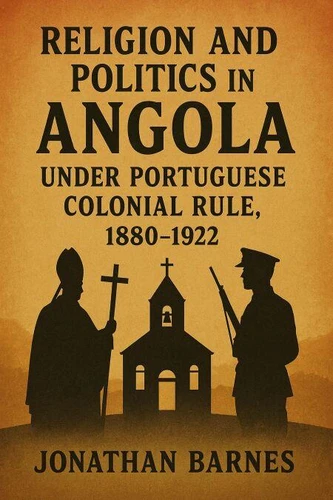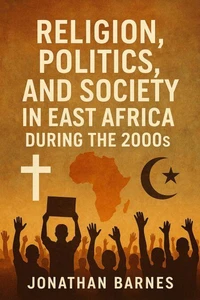Religion and Politics in Angola under Portuguese Colonial Rule, 1880 - 1922
Par :Formats :
Disponible dans votre compte client Decitre ou Furet du Nord dès validation de votre commande. Le format ePub est :
- Compatible avec une lecture sur My Vivlio (smartphone, tablette, ordinateur)
- Compatible avec une lecture sur liseuses Vivlio
- Pour les liseuses autres que Vivlio, vous devez utiliser le logiciel Adobe Digital Edition. Non compatible avec la lecture sur les liseuses Kindle, Remarkable et Sony
 , qui est-ce ?
, qui est-ce ?Notre partenaire de plateforme de lecture numérique où vous retrouverez l'ensemble de vos ebooks gratuitement
Pour en savoir plus sur nos ebooks, consultez notre aide en ligne ici
- FormatePub
- ISBN8227375872
- EAN9798227375872
- Date de parution31/05/2025
- Protection num.pas de protection
- Infos supplémentairesepub
- ÉditeurBig Dog Books, LLC
Résumé
Religion and Politics in Angola under Portuguese Colonial Rule, 1880-1922 by Jonathan Barnes offers a compelling exploration of the intertwined forces of religion and politics during one of the most turbulent periods in Angola's history. Through a deep dive into the Catholic and Protestant missions, the book unveils how religious institutions played a crucial role in consolidating Portuguese colonial control, shaping the lives of indigenous Angolans, and enforcing economic exploitation under the guise of Christian salvation.
With vivid historical analysis, Barnes traces the complex relationship between missionaries and the colonial government, illustrating the subtle ways in which the Church became both a tool of oppression and a source of resistance. The book examines how Catholicism, in particular, aligned itself with the Portuguese state's interests, while Protestantism, though a smaller force, offered an ideological alternative that sowed the seeds of resistance to colonial rule.
Drawing on primary sources and rich historical context, Religion and Politics in Angola offers readers an in-depth understanding of how religion became a political instrument, how it shaped Angolan nationalism, and how these forces collided in the struggle for cultural survival and political autonomy. This book will appeal to historians, political scientists, and anyone interested in the complexities of colonialism, religion, and the fight for independence in Africa.
It is an essential read for understanding the legacy of religion in Angola's path to independence and the continuing impact of colonial structures on modern-day Angola.
With vivid historical analysis, Barnes traces the complex relationship between missionaries and the colonial government, illustrating the subtle ways in which the Church became both a tool of oppression and a source of resistance. The book examines how Catholicism, in particular, aligned itself with the Portuguese state's interests, while Protestantism, though a smaller force, offered an ideological alternative that sowed the seeds of resistance to colonial rule.
Drawing on primary sources and rich historical context, Religion and Politics in Angola offers readers an in-depth understanding of how religion became a political instrument, how it shaped Angolan nationalism, and how these forces collided in the struggle for cultural survival and political autonomy. This book will appeal to historians, political scientists, and anyone interested in the complexities of colonialism, religion, and the fight for independence in Africa.
It is an essential read for understanding the legacy of religion in Angola's path to independence and the continuing impact of colonial structures on modern-day Angola.
Religion and Politics in Angola under Portuguese Colonial Rule, 1880-1922 by Jonathan Barnes offers a compelling exploration of the intertwined forces of religion and politics during one of the most turbulent periods in Angola's history. Through a deep dive into the Catholic and Protestant missions, the book unveils how religious institutions played a crucial role in consolidating Portuguese colonial control, shaping the lives of indigenous Angolans, and enforcing economic exploitation under the guise of Christian salvation.
With vivid historical analysis, Barnes traces the complex relationship between missionaries and the colonial government, illustrating the subtle ways in which the Church became both a tool of oppression and a source of resistance. The book examines how Catholicism, in particular, aligned itself with the Portuguese state's interests, while Protestantism, though a smaller force, offered an ideological alternative that sowed the seeds of resistance to colonial rule.
Drawing on primary sources and rich historical context, Religion and Politics in Angola offers readers an in-depth understanding of how religion became a political instrument, how it shaped Angolan nationalism, and how these forces collided in the struggle for cultural survival and political autonomy. This book will appeal to historians, political scientists, and anyone interested in the complexities of colonialism, religion, and the fight for independence in Africa.
It is an essential read for understanding the legacy of religion in Angola's path to independence and the continuing impact of colonial structures on modern-day Angola.
With vivid historical analysis, Barnes traces the complex relationship between missionaries and the colonial government, illustrating the subtle ways in which the Church became both a tool of oppression and a source of resistance. The book examines how Catholicism, in particular, aligned itself with the Portuguese state's interests, while Protestantism, though a smaller force, offered an ideological alternative that sowed the seeds of resistance to colonial rule.
Drawing on primary sources and rich historical context, Religion and Politics in Angola offers readers an in-depth understanding of how religion became a political instrument, how it shaped Angolan nationalism, and how these forces collided in the struggle for cultural survival and political autonomy. This book will appeal to historians, political scientists, and anyone interested in the complexities of colonialism, religion, and the fight for independence in Africa.
It is an essential read for understanding the legacy of religion in Angola's path to independence and the continuing impact of colonial structures on modern-day Angola.

















